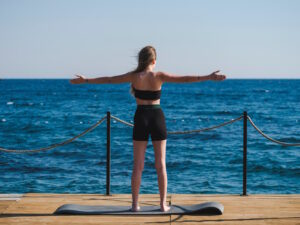
In today’s fast-paced world, stress has become a common part of many people’s lives. Finding effective ways to manage stress and promote relaxation is crucial for overall well-being. Pilates, a mind-body exercise method, offers a range of techniques that can help reduce stress, cultivate mindfulness, and promote relaxation. In this article, we will explore how Pilates helps reduce stress, its connection to mindfulness, the role of yoga as a relaxation technique, and various mindfulness meditation techniques that can aid in stress relief.
How does Pilates help to reduce stress?
Pilates can be an effective tool for reducing stress due to its unique combination of physical movements and mental focus. Here’s how Pilates contributes to stress reduction:
1. Mind-body connection: Pilates emphasizes the mind-body connection, encouraging individuals to focus on the present moment and engage in mindful movement. This shift in attention helps divert the mind from stressors and promotes relaxation.
2. Controlled breathing: Pilates incorporates specific breathing techniques, such as deep diaphragmatic breathing, which stimulates the relaxation response in the body. Deep, rhythmic breathing during Pilates exercises can induce a sense of calm and reduce stress.
3. Release of tension: Pilates exercises often involve stretching and releasing tension in the muscles. This physical release can help alleviate physical and mental stress, promoting a sense of relaxation and well-being.
Does Pilates help with mindfulness?
Yes, Pilates can be a mindfulness practice. Mindfulness involves bringing one’s attention to the present moment, without judgment or attachment to thoughts or emotions. Pilates promotes mindfulness through:
1. Body awareness: Pilates encourages individuals to develop a heightened sense of body awareness, focusing on alignment, movement, and sensations. This increased awareness cultivates mindfulness and the ability to stay present during the practice.
2. Concentration and focus: Pilates exercises require concentration and focus to perform the movements with precision and control. By directing attention to the body and breath, individuals can develop mindfulness skills that extend beyond their Pilates practice.
Can yoga be used as a relaxation technique for stress management?
Yes, yoga is widely recognized as an effective relaxation technique for stress management. Yoga combines physical postures (asanas), breathing exercises (pranayama), and meditation to promote relaxation, reduce stress, and enhance overall well-being. Similar to Pilates, yoga incorporates mindfulness and can be a valuable practice for stress relief.
Which of the following mindfulness meditation techniques can help relieve stress?
1. Body scan: This technique involves systematically directing attention to different parts of the body, noticing sensations, and releasing tension. Body scanning can help relax the body and promote a sense of calm.
2. Loving-kindness meditation: This practice involves cultivating feelings of love, kindness, and compassion toward oneself and others. It can foster positive emotions, reduce negative thoughts, and enhance overall well-being, contributing to stress reduction.
3. Breath awareness meditation: Breath awareness involves focusing on the breath, observing its natural rhythm without trying to change it. This technique can help calm the mind, improve concentration, and reduce stress.
In summary, Pilates offers effective relaxation techniques and mindfulness practices that can help reduce stress. Through its mind-body connection, controlled breathing, and tension release, Pilates aids in stress reduction. Additionally, Pilates promotes mindfulness through body awareness and concentration. While yoga can also be used as a relaxation technique, incorporating mindfulness meditation techniques such as body scan, loving-kindness meditation, and breath awareness can further enhance stress relief.